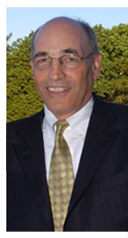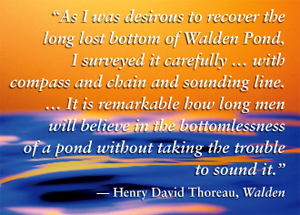


By Angelo Carfagna

ollowing
Thoreau’s
lead,
Willard Gingerich can often be found plunging below the surface to chart the depths of a problem and reveal the heart of the matter.As a scholar passionate about American literature, that tendency has led him to delve deeply into the genius of indigenous literary and oral traditions. “I always felt Thoreau’s comment was an invitation to recover the ‘long, lost bottom’ of America’s culture and history,” he explains.
As an administrator, that trait translates into focusing first, next and last on the most essential elements in all of education: the needs of the students.
After a nationwide search, Gingerich was chosen last year to fill the newly created position of University provost and senior vice president for academic affairs. In this role, he not only serves as the University’s chief academic officer but also is responsible for various centralized administrative functions such as admissions, educational technology, global learning and global relations.
The scope of the assignment was especially alluring for Gingerich, who was serving as vice provost for graduate studies and research as well as professor of English at St. John’s University in New York City. “It was clear that this position was designed to be very influential and that there would be considerable expectations,” he says. “That is both an attractive and challenging prospect.”
Gingerich was equally drawn to the nature and mission of Fairleigh Dickinson University. “This is a dynamic university that is poised to make a significant move forward. I wanted to be a part of that.” He adds that in his short time at FDU he has been “very impressed by the strong, personal commitment of both faculty and staff professionals to the growth and academic excellence of the institution.”
Gingerich also says he was “excited by the mission to prepare world citizens. This mission is not only exactly what students need for the 21st century, but it provides the University a distinctive character and a special identity in a very competitive marketplace.”
He believes that the educated American citizen of the 21st century will have to be a world citizen. Gingerich explains that while this mission should cultivate citizens concerned with our collective welfare, it also is critical for individual career development. Because of the forces of globalization and the growth of the global economy, he explains, “national worldviews — as essential and inescapable as they are — are no longer sufficient for a successful career.”
FDU Magazine Home | Table of Contents | FDU Home | Alumni Home | Comments
©Copyright 2006 Fairleigh Dickinson University. All rights reserved.
For a print copy of FDU Magazine, featuring this and other stories, contact Rebecca Maxon, editor,
201-692-7024 or maxon@fdu.edu.